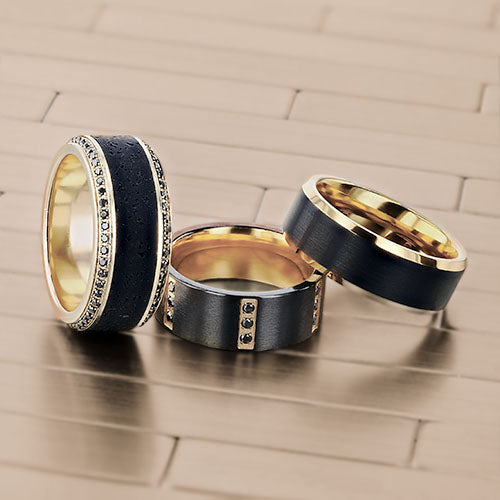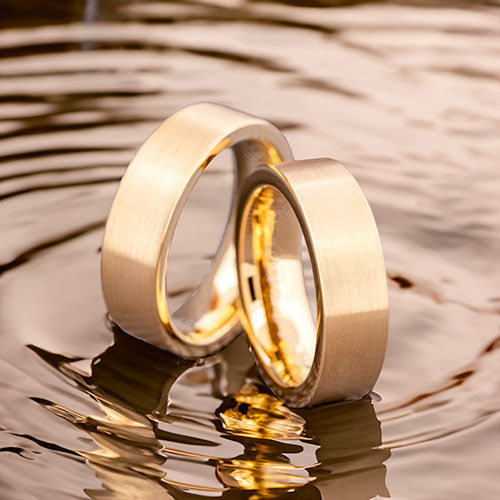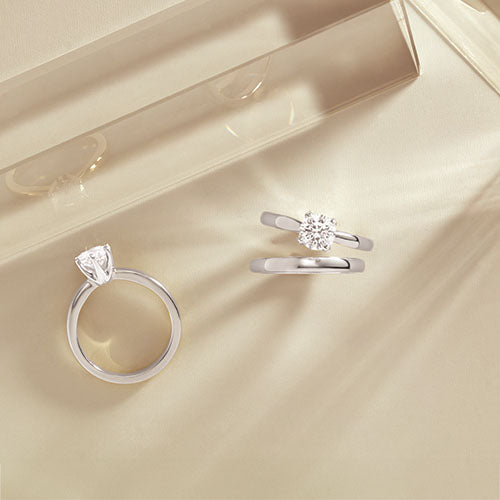Cobalt vs Tungsten Wedding Bands
Vansweden JewelersWhen you're a soon-to-be-spouse spending some time researching the options before committing to a metal, you're likely to ask what's the difference between tungsten and cobalt wedding bands?
Tungsten and cobalt are both metals that are used to make wedding bands. Both are excellent options for those looking for durable and scratch-resistant wedding bands. They look similar and the differences aren't obvious though, so breaking it down into details will help with the decision.
Tungsten Wedding Bands
Tungsten is a dark silver metal that is known for its strength and durability. Tungsten wedding bands are highly scratch-resistant. They maintain their polish and shine forever when treated with moderate care. Tungsten is also a relatively heavy metal, which gives it a substantial and hefty feel. Tungsten wedding bands are typically thicker than bands made of other metals, which can be a plus for some people. Tungsten rings are one of the more popular contemporary wedding band metals, so they are available in most jewelry stores.
Cobalt Wedding Bands
Cobalt is a metal that is similar to tungsten in terms of strength and durability. Cobalt wedding bands are also highly scratch-resistant and maintain their polish and shine extremely well. Cobalt is a relatively heavy metal too, but it's less dense than tungsten, which means it's a bit lighter. Cobalt wedding bands are also typically thicker than bands made of other metals. Cobalt is somewhat more rare than tungsten, so you may want to shop online for the widest selection and best prices. Another difference is that cobalt is less brittle than tungsten, which means it's less likely to crack or shatter.
Choosing Between Tungsten and Cobalt for Your Wedding Band
When it comes to selecting a tungsten or cobalt wedding ring, the choice will often come down to the color of the metal. If you need a ring that very closely matches a spouse's white gold, silver, or platinum ring, cobalt will likely be the better choice. You may also find a ring in a style that you like that's only available in one metal or the other.
There's another factor to consider when choosing a tungsten or cobalt wedding ring: weight. Tungsten rings are known for their substantial weight, which gives them a solid and robust feel, while cobalt rings are lighter, making them ideal for those who prefer a lighter ring.
As far as skin sensitivities go, most people don't need to worry about either metal. Both are very unlikely to cause a reaction. Both types of rings are made from alloys of more than one metal and the composition depends on the exact ring, so it's not possible to make a general statement about them, except that cobalt rings will of course always contain cobalt, but tungsten rings will not. Some people are sensitive to cobalt and they may experience skin irritation or a rash when wearing cobalt or even tungsten rings, if the tungsten carbide contains cobalt (and many do). However, these types of allergic reactions are relatively rare. Even if you know that a cobalt ring won't work for your skin, a tungsten carbide ring that contains cobalt may still be a viable choice due to the small percentage of cobalt that's used in the ring and the way the metals combine with each other. In general, if sensitivities are a consideration for you, check with your jeweler for options. They may be able to let you test one for a small period of time or find other options that will work for you before you commit.
Imagine exchanging your wedding vows while wearing a ring that perfectly reflects your personal style and represents the strength of your love. With both tungsten and cobalt wedding rings, you have the opportunity to make this moment even more special. So, whether you're looking for a heavy and substantial ring or a lighter one, the choice is yours. The only thing that's left is to make a decision and seal your love with a ring that will last a lifetime.
Tungsten vs Cobalt Wedding Bands Comparison Chart
| Tungsten | Cobalt | |
| Color | Dark silver | Bright silver |
| Weight | Heavy | Medium weight |
| Qualities | Somewhat brittle | More resistant to drops |
| Durability | Most scratch-resistant | High scratch-resistance |
| Availability | Widely available | More specialized |














